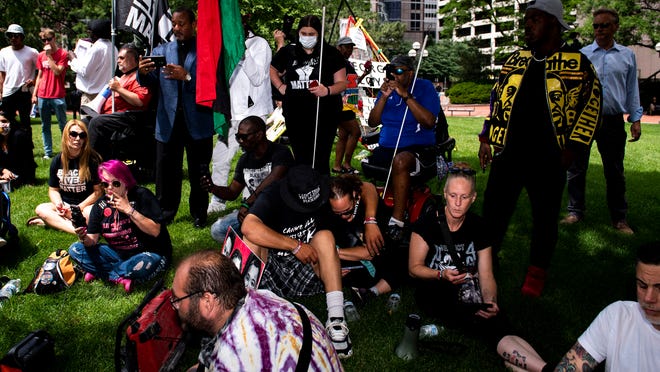Three former Minneapolis police officers were found guilty on all counts Thursday of violating the civil rights of George Floyd.
Thomas Lane, J. Alexander Kueng and Tou Thao were charged and found guilty of depriving Floyd of his right to medical care as Derek Chauvin pressed his knee into Floyd’s neck for more than nine minutes.
Thao and Kueng were also convicted of willfully failing to intervene and stop Chauvin in the May 25, 2020, killing.
“These officers tried to devise any excuse that could let them wash the blood from their hands, but following these verdicts George’s blood will forever stain them,” Floyd’s legal team said in a statement. “Today’s guilty verdicts should serve as the guiding example of why police departments across America should expand and prioritize instruction on an officer’s duty to intervene and recognize when a fellow officer is using excessive force.”
The jury deliberated for a total of 13 hours after closing arguments on Tuesday before reaching a verdict.
The former officers were tried together but charged separately because of their different roles in Floyd’s killing. Thao held back bystanders. Kueng helped restrain Floyd by kneeling on his back, and Lane held the feet of the 46-year-old Black man.
Lane is white, Kueng is Black, and Thao is Hmong.
Lane shook his head and looked at his attorney as his verdict was read, according to a pool report. Thao and Kueng showed no visible emotion.
Conviction of a federal civil rights violation that results in death is punishable by life in prison or even death, but such sentences are extremely rare. The former officers will remain free on bond pending sentencing.
A HIGHER LEVEL OF PUNISHMENT’:What the hate crime verdicts in Ahmaud Arbery’s death say about justice and race in America
The trial lasted for about a month and included testimony from an officer who provided medical training to two of the defendants and from the officers themselves.
Prosecutors argued the three officers violated their training when they failed to roll Floyd on his side or give him CPR. The officers stood by as Chauvin slowly killed Floyd, when even bystanders without medical training could see he needed help, they said.
While prosecutors said the officers’ training meant they knew they had a duty to stop Chauvin and render medical aid, defense attorneys argued the Minneapolis Police Department’s training was inadequate.

They also argued police culture teaches officers to defer to their seniors, saying Chauvin called all the shots at the scene. Lane and Kueng, both rookies, argued they deferred to Chauvin. Thao testified he relied on the other officers to care for Floyd’s medical needs with his attention elsewhere.
Chauvin pleaded guilty to the federal case in December. He had already been convicted of state murder and manslaughter charges in Floyd’s death and was sentenced to 22½ years in prison.
THIS IS AMERICA:Sign up for USA TODAY’s free weekly take on the news from reporters from a range of backgrounds and experiences
“This case highlights so many of the failures in our policing system,” Ben Feist, interim executive director of the ACLU of Minnesota, said in a statement. “Officers targeted a Black man for disparate treatment and then used the debunked theory of ‘excited delirium’ to attempt to justify their horrifying act of violence. They used overwhelming and unnecessary force over a minor offense.”
Eighteen people were selected to serve as jurors in January, including six alternates. Fifteen people remained after closing arguments – 12 who deliberated and three alternates. U.S. District Judge Paul Magnuson, who oversaw the federal trial, ordered Wednesday that the jurors’ names be sealed for at least 10 years.
Lane, Kueng and Thao also face a separate state trial in June on charges alleging they aided and abetted murder and manslaughter.
Contributing: The Associated Press
